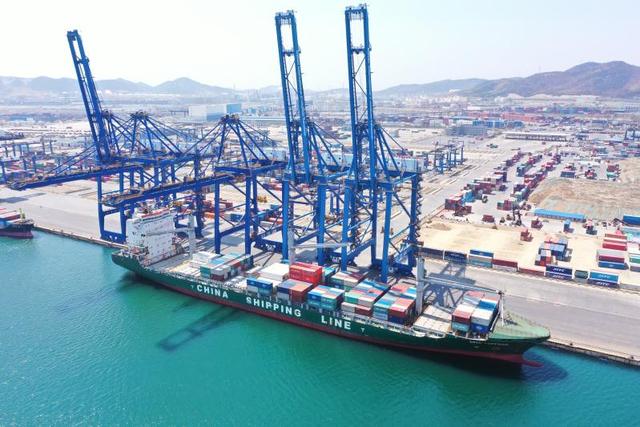經濟學家指出,盡管新冠肺炎疫情仍有不確定性,但中國的經濟複蘇將惠及東盟成員國。商務部數據顯示,在2020年第一季度,東盟取代歐盟成爲中國最大的貿易夥伴。
A ship unloaded 565 tons of dragon fruit imported from Vietnam at the Dalian container terminal in Dalian, Liaoning province, on April 27, 2020. [Photo by Yu Xinwen/for chinadaily.com.cn]
China’s economic recovery is set to benefit member states of the Association of Southeast Asian Nations (ASEAN), even amid continuing uncertainty over COVID-19, a leading Asian economist said.
亞洲一位知名經濟學家說,盡管新冠肺炎疫情仍存在不確定性,但中國的經濟複蘇將惠及東南亞國家聯盟(簡稱東盟)成員國。
“China is an important economic partner of ASEAN, and at a time when the developed economies are suffering from a sharp downturn, China is the only large source of demand that could still be growing,” said Manu Bhaskaran, founding director and CEO of Centennial Asia Advisors, an economic consultancy in Singapore.
新加坡經濟咨詢機構百年亞洲咨詢公司的創始董事兼首席執行官馬努·巴斯卡蘭說:“中國是東盟重要的經濟夥伴。在發達經濟體經濟遭受重創之際,中國是唯一的巨大需求來源,且需求仍在增長。”
China has been ASEAN’s largest trading partner for 10 years, according to the Ministry of Commerce. Meanwhile, in the first quarter of 2020, ASEAN replaced the European Union as China’s largest trading partner, accounting for 15.1 percent of the nation’s global trade volume during the period, according to the General Administration of Customs.
根據中國商務部的數據,中國10年來一直是東盟最大的貿易夥伴。與此同時,根據海關總署的數據,在2020年第一季度,東盟取代歐盟成爲中國最大的貿易夥伴,占中國同期全球貿易額的15.1%。
Noting the easing of restrictions and the stimulus programs to boost the domestic market, Bhaskaran told China Dailythat the Chinese economy will be able to stabilize in the second quarter and then enjoy “a vigorous recovery”.
巴斯卡蘭在接受《中國日報》采訪時指出,放寬限制措施和刺激計劃提振了國內市場,中國經濟將能夠在第二季度企穩,然後迎來“強勁複蘇”。
“So far, the data seem to suggest that Chinese consumers are resilient and are stepping up spending, supporting demand,” he said.
他說:“目前的數據表明,中國的消費者具有很大韌性,他們正在擴大消費,支撐需求。”
Despite the biggest GDP contraction in decades-the economy shrank 6.8 percent year-on-year in the first quarter-China’s consumer market has shown signs of accelerated recovery. During the five-day May Day holiday, online sales of physical commodities witnessed a 36.3 percent year-on-year surge, according to the Ministry of Commerce.
盡管中國的國內生産總值出現了幾十年來最大的下降(今年一季度,我國GDP同比下降6.8%),中國的消費市場已經顯示出加速複蘇的迹象。根據商務部的數據,在五天的“五一”假期期間,實體商品的網上銷售額同比激增36.3%。
With economic development a main topic at this year’s two sessions, Bhaskaran sees some key issues that need to be addressed. “The employment situation remains tenuous and the sharp decline in global demand also points to continuing downside risks to the Chinese economy,” he said.
隨著經濟發展成爲今年兩會的主要議題,巴斯卡蘭看到了一些需要解決的關鍵問題。他說:“就業形勢依然嚴峻,全球需求大幅下降也表明,中國經濟面臨持續下行風險。”
tenuous [ˈtenjuəs]:adj.脆弱的
China will prioritize stabilizing employment and ensuring people’s livelihoods this year, aiming to create more than 9 million urban jobs, according to the Government Work Report delivered by Premier Li Keqiang on Friday.
5月22日,國務院總理李克強在政府工作報告中指出,今年要優先穩就業保民生,努力實現城鎮新增就業900萬人以上。
More supply-side reforms will also help the Chinese economy sustain a recovery with good foundations, said Bhaskaran.
巴斯卡蘭表示,更多的供給側改革也將有助于中國經濟在良好基礎上保持複蘇態勢。
As China undergoes a recovery, it can affect ASEAN economies through many channels, said Bhaskaran.
巴斯卡蘭說,隨著中國經濟複蘇,它可以通過許多渠道影響東盟經濟體。
For instance, the rise of demand in China could spill over into rising demand for ASEAN’s exports of commodities and manufactured goods, while commodity prices and business confidence could also be boosted, said Bhaskaran, noting prices for commodities such as iron ore, coal and copper are already rising in line with China’s recovery.
比如,中國需求的增長或將使得東盟大宗商品和制成品出口需求上升。同時,大宗商品價格和商業信心也可能得到提振。他指出,鐵礦石、煤和銅等大宗商品價格已隨中國經濟複蘇而增長。
As for the proposed Regional Comprehensive Economic Partnership, Bhaskaran said the pandemic has not had any impact on participating countries’ desire to finalize the agreement according to the timeline.
至于擬議的《區域全面經濟夥伴關系協定》,巴斯卡蘭說,疫情沒有對參與國根據時間表最終達成協議的願望産生任何影響。
The RCEP is a proposed free trade agreement between ASEAN and its six FTA partners: China, Japan, South Korea, India, Australia and New Zealand. In March, the Ministry of Commerce said China will continue to advance the signing of the agreement at the end of 2020 as scheduled.
《區域全面經濟夥伴關系協定》是東盟與中國、日本、韓國、印度、澳大利亞和新西蘭六個自貿夥伴之間擬議的自由貿易協定。今年3月,中國商務部表示,中國將繼續按計劃推進2020年底簽署該協議。
In addition, Chinese investment either through private channels or via the Belt and Road Initiative could also contribute to investment in ASEAN, Bhaskaran said.
此外,巴斯卡蘭說,中國通過民間渠道或“一帶一路”倡議進行的投資也可以促進對東盟的投資。
China is one of ASEAN’s most important sources of foreign direct investment. In 2018, FDI flows from China to ASEAN reached $10.2 billion, or 6.6 percent of ASEAN’s total FDI, according to Xinhua News Agency, citing a statement by economic ministers from ASEAN and China.
中國是東盟最重要的外國直接投資(FDI)來源國之一。新華社援引東盟和中國經濟部長的一份聲明稱,2018年,中國對東盟的FDI達到102億美元(約合人民幣727億元),占東盟FDI總額的6.6%。
However, Bhaskaran said tourism, a key area for ASEAN-China exchanges, is unlikely to reemerge as a growth driver for some time to come, due to the pandemic.
不過,巴斯卡蘭表示,由于新冠肺炎疫情,作爲東盟與中國交流的一個關鍵領域,旅遊業在未來一段時間內不太可能重新成爲增長動力。
Given the pandemic’s continuing impact, Bhaskaran said relaxation of restrictions on cross-border travel, especially for tourism, remains uncertain. And the travel restrictions, which he expects to last till next year, will also make travel less enjoyable, he added.
巴斯卡蘭說,鑒于疫情的持續影響,放松對跨境旅行的限制,特別是對旅遊的限制,仍然是不確定的。他預計旅行限制將持續到明年,這也會讓旅行變得不那麽愉快。
英文來源:中國日報
翻譯&編輯:yaing
來源:中國日報網
